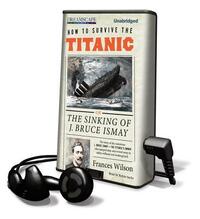Take a photo of a barcode or cover
challenging
slow-paced
Many reviews remark the tedious nature of the Joseph Conrad elements of this book. But having read Conrad myself, the author actually does a great job making Conrad's work enjoyable and interesting.
A good look at Ismay's psyche before, during, and after the sinking. If you're a hardcore enthusiast for the Titanic, this one is for you.
A good look at Ismay's psyche before, during, and after the sinking. If you're a hardcore enthusiast for the Titanic, this one is for you.
dark
emotional
informative
reflective
sad
slow-paced
This was really odd. I’ve never read a book like it. It reminded me of being in high school when your teacher would assign a paper comparing two subjects. The author here compared J. Bruce Ismay, managing director of the Titanic who survived its sinking, with the book Lord Jim by Joseph Conrad. Lord Jim was written before the Titanic, and while it’s main character is comparable to Ismay in that he survived a sinking ship only to face major consequences later, it was a bit much to write a whole book about it.
This book was very well researched, so I don’t want to take away from the hard work the author put into it, but Wilson could hardly conceal her disdain for Ismay. Admittedly, he was a very polarizing figure. Many wanted to blame someone for the horrific loss of life, but there were so many conflicting accounts of how Ismay behaved that night that I find it hard to form much of an opinion on him. I find it hard to believe he was as calculating as some seem to think. It’s easy to judge the way people react to traumatic situations when you weren’t there. I find it more believable that, in the midst of the chaos of the sinking, Ismay saw an opportunity to save himself before the ship went down and took it without much thought. Self-preservation is a strong instinct. I wish Wilson had done less editorializing and just let the available information speak for itself.
This book was very well researched, so I don’t want to take away from the hard work the author put into it, but Wilson could hardly conceal her disdain for Ismay. Admittedly, he was a very polarizing figure. Many wanted to blame someone for the horrific loss of life, but there were so many conflicting accounts of how Ismay behaved that night that I find it hard to form much of an opinion on him. I find it hard to believe he was as calculating as some seem to think. It’s easy to judge the way people react to traumatic situations when you weren’t there. I find it more believable that, in the midst of the chaos of the sinking, Ismay saw an opportunity to save himself before the ship went down and took it without much thought. Self-preservation is a strong instinct. I wish Wilson had done less editorializing and just let the available information speak for itself.
Could've been better without the garbage relating to Lord Jim. Total waste of space and I skipped those sections completely, as they were not relevant no matter how the author tried to make them so.
It's a very interesting book. It tells the story of the Titanic from J. Bruce Ismay's perspective. The historical research shows that Ismay's is a truly misunderstood character. If you are interested in the Titanic, this is a book for you.
"J. Bruce Ismay died on the night of 14–15 April 1912, and died again in his bedroom twenty-five years later. He was mired in the moment of his jump; his life was defined by a decision he made in an instant. Other survivors of the Titanic were able, in varying degrees, to pick themselves up and move on, but Ismay was not. His was now a posthumous existence."
Before starting, I was slightly worried that this book would be less objective than it turned out to be, and that the author would feel the urge to insert personal opinions within what should be a factual text. I think everyone reading this or any other account about Ismay's ordeals before, during, and after the wreck will likely develop a stance on how just or unjust Ismay's actions were in the years that followed. But an account is not the place for that. Neither is a review for that matter, so you won't find anything here.
The work itself was highly engrossing. I'm not a stranger to the subject, but I haven't come across a book on the RMS Titanic that focused so heavily on the aftermath where the law was concerned. I was impressed with the amount of detail that was given, in despite of redundancy and repetition.
I'm also really glad I decided to read this after reading some of the other reviews. I highly doubt the reviewers that stated that the second half of the book was entirely about Lord Jim cared to read on after the first mention of Conrad. The author does include a sizable few chapters comparing and contrasting fact and fiction, but it in no way encompasses half the text.
Whatever one may think about J. Bruce Ismay, I think he deserved this text. I wouldn't go so far as to use the word "humanize", but it at least adds more depth to a figure, dare I say a man, that is entitled to have his full story told without Horner playing in the background.
Before starting, I was slightly worried that this book would be less objective than it turned out to be, and that the author would feel the urge to insert personal opinions within what should be a factual text. I think everyone reading this or any other account about Ismay's ordeals before, during, and after the wreck will likely develop a stance on how just or unjust Ismay's actions were in the years that followed. But an account is not the place for that. Neither is a review for that matter, so you won't find anything here.
The work itself was highly engrossing. I'm not a stranger to the subject, but I haven't come across a book on the RMS Titanic that focused so heavily on the aftermath where the law was concerned. I was impressed with the amount of detail that was given, in despite of redundancy and repetition.
I'm also really glad I decided to read this after reading some of the other reviews. I highly doubt the reviewers that stated that the second half of the book was entirely about Lord Jim cared to read on after the first mention of Conrad. The author does include a sizable few chapters comparing and contrasting fact and fiction, but it in no way encompasses half the text.
Whatever one may think about J. Bruce Ismay, I think he deserved this text. I wouldn't go so far as to use the word "humanize", but it at least adds more depth to a figure, dare I say a man, that is entitled to have his full story told without Horner playing in the background.
slow-paced
A Joseph Conrad biography and Lord Jim book report with some stuff about the Titanic thrown in.
informative
reflective
I made it through the section on the Titanic hearings in America and then lost interest. I might return to it some day. It's an interesting read, I just didn't have the capacity for it anymore.
The book was less about Mr Ismay, and more about Conrad and Lord Jim




